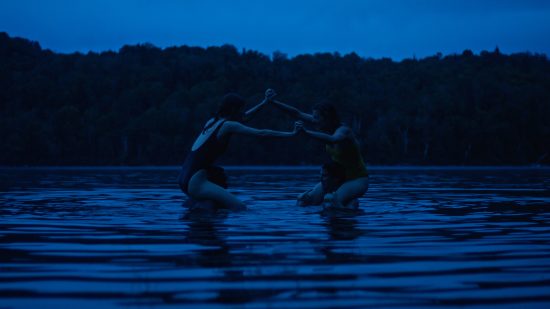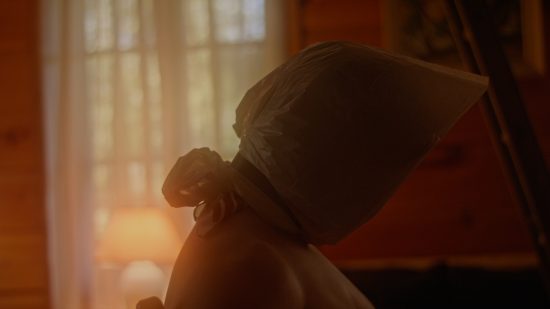Violation – Directors Madeleine Sims-Fewer and Dusty Mancinelli on their Debut Feature
At the 2020 Toronto International Film Festival (TIFF), a movie premiered that was described by programmer Peter Kuplowsky as, ‘A thousand-yard stare into human cruelty.’ Far away from the enthusiastic Midnight Madness crowds that would normally fill the Ryerson theatre due to COVID, Violation instead premiered largely in people’s homes, yet was no less effectual in bringing a visceral and emotionally taxing look at the toll trauma takes on a person. Arriving to critical acclaim (you can read my review here) both at TIFF as well as during its recent international premiere at Sundance, Violation is looking to continue its successful festival streak this week at SXSW, before arriving to Canadian streaming March 19th. Co-directors and writers Dusty Mancinelli and Madeleine Sims-Fewer (who also stars), chatted with me over Zoom (naturally) from their base in Toronto to talk about their personal first feature film and the conversations its likely to spark.
While both Mancinelli and Sims-Fewer attended York University, even sharing circles of friends, they didn’t meet until 2015 on the first day of the TIFF Talent Lab. Held during the Toronto International Film Festival each fall, the competitive program looks to aid emerging directors and screenwriters in developing their creativity. “We almost immediately became friends,” remembers Sims-Fewer. “We immediately had very similar tastes and we had a lot to talk about and over that festival had so many creative conversations. It was a real kind of a magical time of creative thinking and creativity and watching movies.”
The duo returned to York University to complete their Masters degrees where they had the opportunity to direct together for the very first time. “It was really the first time we both enjoyed the process of making a film, not just having made something,” Mancinelli says. “It was just really exciting to be able to challenge each other creatively. And because we’re looking at everything we do from two very different perspectives, it really strengthens the work that we do. I don’t think we really could be making these films on our own. So there’s something really special about it.”
Their collaboration lead to them making several short films over a five-year span before finally making the leap towards their first feature film, Violation, something that lended itself to some anxiety for the filmmakers. Says Sims-Fewer, “It seems like an insurmountable mountain that’s just looming in the horizon, and you know it’s going to be terrifying.” Mancinelli agrees, adding that there is some “mystery” to the feature film format as a short filmmaker, but he found that the largest difference between the two was the physical and mental stamina it required. “We filmed in the mountains in Quebec and we prepped for a full month. Then we had two months of filming and because we were producing, writing, and directing it and Madeleine was starring at it, we didn’t really have a lot of time off,” he notes. Even just the setting of the film had physical challenges, hiking into gorges and days for cast and crew spent in chilly Canadian lakes. “I think that was really something we weren’t anticipating or weren’t prepared for,” Mancinelli says. Only half-jokingly he continues, “I think in the future, we’ll train for a marathon, physically train for a marathon, so that we’re just really fit and ready with that kind of mental endurance.”
Violation tells the story of Miriam (Sims-Fewer), a woman travelling to a secluded cabin with her husband Caleb (Obi Abili) to visit with her sister Greta (Anna Maguire) and brother-in-law, Dylan (Jesse LaVercombe). While there, she experiences a truly horrific, violent act and a betrayal of trust that leads to unexpected consequences as she acts on her trauma-fuelled impulse for revenge. Miriam, as well as her relationships are forever changed.
A powerful, and visceral film, it was also a personal one for the co-directors. “Part of our friendship that was forged at TIFF was really found around our shared histories of abuse and trauma in our past,” says Mancinelli. Their short films also share common themes. He continues, “It was really important to us to tell a story from one woman’s perspective and really try to capture a visceral experience for the audience of post-traumatic stress and residual trauma.”
Violation has many aspects that make it often a mentally and emotionally challenging watch, something that Sims-Fewer certainly acknowledges as she even thanked me for watching the film twice in preparation for this interview (to be fair, my viewings were 5 months apart, so I’m certainly no hero!). The film is interlaced with plenty of disorienting close-ups and jumps in time as well as scenes depicting the natural beauty, and sometimes harsh reality, of their surroundings in Quebec.
The way nature is used in the film, it almost becomes its own character, uniquely balanced and curated. Sims-Fewer notes that the role of nature, “Creates an almost fairy tale feeling and undercurrent that we use in these transitional moments where we are taking the audience back to the past or the present.” Mancinelli adds that they have a distinct interest in the power and beauty of nature. “There’s something really interesting about how morality doesn’t quite exist in the natural world. We watch a wolf tear up the stomach of a rabbit and we are not judging that wolf. We are not thinking it’s a murderer or a monster because of how we examine the natural world as humans. I think because the film deals a lot with morality, what is moral, what is right, we just felt that the juxtaposition was really engaging and interesting.”
Yet while those ideas of morality, vengeance, cruelty and trauma run straight through Violation, the filmmakers worked against typical ‘revenge film’ tropes, reimagining their entry to the genre. Says Sims-Fewer, “We were thinking a lot about revenge films and how tantalizing the idea of revenge is and how that wish fulfillment for someone who has gone through a traumatic experience, that there’s something about that that’s very seductive. We wanted to do something that was sort of the opposite of that, that really unpacked this idea of what revenge would really do to a person… Because we didn’t think that revenge would bring that cathartic closure that this person is looking for.” In fact Mancinelli describes Violation as an “anti-revenge” film, where their protagonist, “erodes her morality and all of her relationships around her are fundamentally changed and destroyed as a result.”
Bringing a personal aspect to this ‘cautionary tale’ also meant altering our own ideas of who the typical perpetrators and abusers are. “I think what’s really important to us was in this genre, you’re so used to seeing a kind of stranger-in-the-alleyway, moustache-twirling villain, who’s just obviously a bad person, who’s nefarious,” notes Mancinelli. “But from our personal experiences of abuse, it’s usually someone who you love or care about, who you trust, who does this unthinkable thing.”
That’s something that serves to challenge the audience more, especially as Violation’s non-linear story telling only slowly reveals each character’s true colours. It’s a deliberate choice that adds to the audience’s engagement and forces them to think more about these complicated relationships and personalities. Adds Sims-Fewer, “When someone does something like this to a person that close to you, you get all the opinions of the family and the people around them. It’s so much more complex than it just being a stranger.”
Not a stranger to the filmmakers was one of their stars, Jesse LaVercombe, whom they had previously collaborated with in their short films Chubby and Slap Happy. While they were prepared to need to convince him to play the integral role of Dylan, their strong relationship with the actor meant he enthusiastically took on this… revealing role. “We gave Jesse the script and we said, ‘Before you read it, there’s full frontal male nudity, we don’t want to change that, that’s really integral. So only if you’re comfortable with it,’” says Mancinelli. Clearly LaVercombe, who himself comes from a theatre background, felt trusting of and comfortable with the filmmakers, working with them to create Dylan as a ‘complex and fascinating’ character. And in these scenes during Miriam’s act of revenge where he’s physically exposed it creates a raw vulnerability which only heightens the realism of what is to come.
The visuals depicting Miriam’s revenge were shot over a five day period, a complex and complicated endeavour for the filmmakers that included a stunt coordinator, stunt double, and medic amongst the many technical aspects at play. “We needed it to feel real. We didn’t want it to feel like a film or sensational, we wanted the fights to be scrappy and just really frantic. And that definitely came with a lot of challenges,” says Sims-Fewer. That realism came with a daunting task for Sims-Fewer as an actor – actually vomiting for the scene. Downing a pint of egg whites and a pint of salt water she says does the trick pretty quickly, but the authenticity was important, despite her hatred of throwing up. “The shapes that your body makes when you’re throwing up, you can’t fake them because when it happens, it’s like a convulsion, it happens in the moment,” she notes. “We wanted Miriam to maintain her humanity in these awful moments where she’s doing these unthinkable things. We wanted the audience to understand that she’s still a human being and she’s disgusted with herself.”
While watching this film, especially the lead up to these realistic and violent scenes where Miriam imparts her sentence of revenge, one can’t help but wonder if even a tiniest amount of remorse could have saved both Miriam and Dylan from their fates. It was something I also thought deeply about while watching another film this year, Promising Young Woman. It’s what Maincinelli calls ‘the tragedy of the movie,’ the fact that if Dylan, or even Greta, who didn’t believe her sister’s truth, acknowledged their behaviours, things would have been very different. It’s just one of the many layers to this story for audiences to dissect.
While both filmmakers acknowledge that this film is apt to be viewed in different ways, they in no way feel there should be ambiguity about the assault that happens to Miriam. “The film deals a lot with questions around consent and our perceived understanding of who we trust in our lives and whether or not they’re really there to support us, or if they’re there to betray us,” says Mancinelli. He hopes that, “People are approaching it in a non-judgmental, open way that sparks conversation and deeper understanding.” Violation for all its shocking and gory moments still remains starkly grounded in reality where these discussions are greatly needed.
In the midst of talking to these two talented, well-spoken individuals, a black cat in the background running along the couch, I was struck by their openness to reveal their personal connection to this subject matter. While some would be quick to dismiss Violation as a violent, gruesome, revenge film, there are so many layers of complexity that can only be fuelled by connection. These ideas about remorse, consent, assault, and traumatic stress run right through this film which eventually leads us to look at our own humanity and morality.
Violation is that ‘thousand yard stare into human cruelty’ TIFF described, and it stares right back at us. And still, in between the blood and the (actual) vomit, and the beautiful yet haunting chords of Pergolesi’s Stabat Mater which open and close the film, there is poignancy. Poignancy mirrored in the thoughts of Madeleine Sims-Fewer whose words I still ponder: “It’s important to understand that cruelties will always happen and forgiveness is important. It’s what you have to keep remembering, and I think there’s a real impulse, especially right now in the world that we live in, and in our society to immediately condemn and to say, ‘This is the act you’ve done, this is who you are forever.’ I think we hope that that changes and that people can be a bit more forgiving of each other and listen and have a bit more empathy for each other.”
Violation screens to U.S. audiences at SXSW Online Thursday, March 18th (information here) and will be available digitally across Canada on March 19th via the TIFF digital platform.














